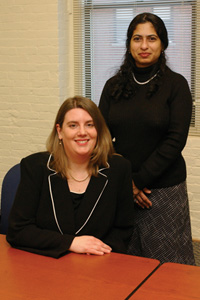 |
|
||
|
|||
Delta Dental underwrites SDM’s program to increase number of minority dentists
By Jessica Ullian
|
|
SDM’s Ana Karina Mascarenhas (right) and Michelle Henshaw proposed the Delta Scholars Program, which will recruit dental students to practice in low-income communities. Photo by Vernon Doucette |
|
A recent survey of Massachusetts third-graders showed that dental decay disproportionately affects children whose families cannot afford medical insurance. Nearly half of the children surveyed who are insured through the state program MassHealth have untreated dental decay, and 16 percent have urgent needs and require immediate care. Even more alarming, doctors say, is the fact that decay is preventable with the right care — the problem is simply a lack of qualified dentists practicing in low-income areas.
Delta Dental of Massachusetts, a major insurance provider, is partnering with Boston University’s School of Dental Medicine to seek a solution. The Delta Scholars Program, launched this year with a $4 million endowment from Delta Dental, will help place dentists in low-income communities by recruiting qualified minority and inner-city applicants to SDM, and offering partial scholarships to offset the expensive cost of a dental education. Scholarship recipients will sign a contract pledging to start or join practices in underserved areas throughout the state upon graduation.
“We have a social obligation, and we take that very seriously,” says Rob Compton, the chief dental officer at Delta Dental’s Dental Services of Massachusetts. “The face of our population is changing, and we need the profession to reflect the face of the people of our state.”
The Delta Scholars Program was envisioned by SDM’s Ana Karina Mascarenhas, director of the division of dental public health, and Michelle Henshaw, director of community health programs. When looking at the higher rates of dental decay among low-income and minority populations, they found that minority dentists are statistically more likely to treat minority patients. However, there are simply not enough dentists treating these populations in Massachusetts, partly because of a dearth of minorities practicing dentistry and partly because of the prohibitive costs of dental school. “Dental students graduate with upwards of $160,000 in debt, and starting a dental clinic is even more expensive,” explains Mascarenhas. “So going to work in underserved areas and in community health centers is not affordable, even if someone wants to do it.”
The proposal that Henshaw and Mascarenhas developed addresses both the lack of dentists and the financial difficulties associated with practicing in a low-income community. The first part of the program offers a second chance to local dental-school applicants who were previously not accepted due to deficiencies in their transcripts or standardized-test scores. In a master of arts in medical science program, similar to the postbaccalaureate programs that often serve as a precursor to medical school, prospective students who have already earned a bachelor’s degree can enroll for one year at the School of Medicine, where they will take courses in biochemistry, physiology, and dental anatomy, as well as prepare for the Dental Admission Test.
The course is designed particularly for students who might not have planned to become dentists when they began college and do not have the grades or the science courses required for dental school. “Sometimes people get serious about school in their junior or senior year,” Mascarenhas says, “but if you want to go to dental school, it doesn’t suffice to bring up your grade point average from the previous years.”
The second component, an early-selection program, targets undergraduates at colleges statewide. Students who are interested in dentistry but need more training in the sciences will apply to the program during their sophomore year and spend summers taking undergraduate science courses at Boston University. For their senior year, they will enroll in the College of Arts and Sciences and the School of Dental Medicine; after completing their undergraduate degree requirements, they will transition into full-time students at SDM, with a partial scholarship. Delta Dental’s $4 million gift is expected to create a permanent endowment with a projected annual income of $160,000.
“The gift will significantly augment the school’s well-established community service mission,” says SDM Dean Spencer Frankl. “Not only does SDM become further diversified, but we will expand the number of minority practitioners, all with the goal of reducing oral health disparities.”
The programs, which will ultimately provide two students with scholarships each year, are scheduled to begin this fall when two students enroll in the master of arts in medical science program. Mascarenhas says that recruiting for the early admissions program will begin at the same time at several local institutions, and the first student will start his or her senior year at Boston University in the fall of 2008.
More than 70 colleges have already been identified as potential recruitment sites, and the first group of candidates for the master’s program is likely to come out of SDM’s current applicant pool. “We looked through a list of all the schools in Massachusetts,” Mascarenhas says, “and we thought we’d start in our own backyard.”
![]()
18
February 2005
Boston University
Office of University Relations
